What do I need for a webinar? 7 steps to a successful webinar!
What is a webinar?
The word combination web-inar tells you what it’s all about: the elaborate combination of “web” and “seminar”. So webinars have something to do with a seminar… on the internet. More precisely, a webinar is a video-conferencing and video-marketing tool. This special form of seminar was developed to prepare and provide content and information to users online in an especially attractive and easily digestible way.
Why are webinars so popular?
Webinars are particularly popular, both with their creators and participants. They are often 45 minutes to an hour long and offer compressed information on a specific topic. When a person clicks on the “Participate” button on your website, you know that they are potentially interested in your topic and you can reach your target group in a great way. The ticket to the webinar is then sent to the person by providing their e-mail address.
Another reason why webinars are so successful nowadays is because so many people have shifted to a home office environment. In one of my recent blog posts I gave you the best tips for your home office. This time we will focus on making you successful in creating a webinar.

What benefits do you get from webinars?
Webinars are therefore an excellent medium to…
- strengthen your expertise,
- build trust with your future customers and
- convey content and knowledge in a modern, effective and entertaining way.
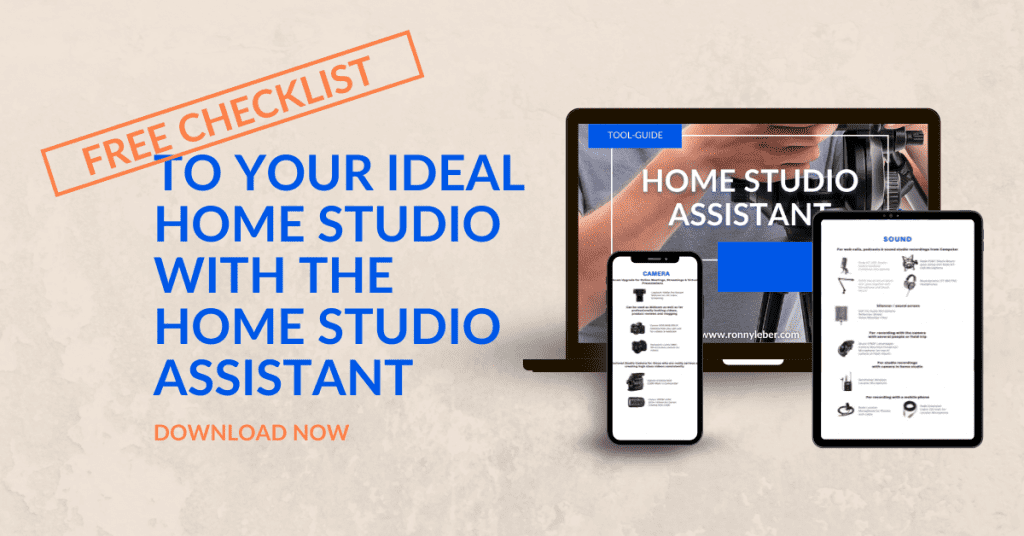
With your HOME STUDIO ASSISTANT to your perfect home studio
Click on the button below to get your HOME STUDIO ASSISTANT guide with everything you need for your home studio.
1. What do you want to achieve with your webinar?
To start planning your webinar, you need to make a decision about what you want to achieve with it.
- Do you want to make yourself known as an expert and deepen your expertise?
- Do you want to better position your brand or tune your branding?
- Or do you just want to build your email list by giving a free webinar on your topic?
- Maybe you have launched a new digital product and want to promote it and generate more leads?
Your goal also determines the type of webinar
We should start with the question of what the goal is. What kind of webinar should your participants see?
- Product webinar
- Webinar with guests
- Webinar for training purposes
- Recorded live events
- On-demand webinars

2. Who do you want to target with your webinar?
In the next step you should clearly define your target group. The information you want to share has to be tailored to your audience. The preparation for this starts with questions like:
- What should my participants do at the end of my presentation?
- For what kind of person are such webinars interesting?
- What needs are already causing my ideal customer to brood over solutions?
The right time for webinars
Think about the right time for live webinars. For example, if your target group is senior management, 9 a.m. on Mondays is certainly the wrong time. Even if your platform offers the possibility of recording, live comments and questions in the chat simply contribute much more to interaction.
The name determines the first impression
If you are clear about your target group and webinar time, the next step in your webinar preparation is already underway: a crisp, promising name for your webinar is needed. The name should ideally already be used to indicate the benefits your participants will receive. The name and other content will always be placed on the platform on which you offer the webinar.
If the name is well chosen or the planned time is adapted to your target group, nothing stands in the way of the first registrations. I will now share some important tips on how best to prepare your presentation.
3. Do it all yourself or get professionals on board: The choice of the moderator
Many people think about whether they will be able to hold a webinar on their own, especially during the first webinar. It depends on your goal, your target group and the complexity of your topic.
It can be extremely helpful and relaxing to have someone to support you during the chat. When you go live, you don’t have to worry about your users’ questions. Sometimes a technical problem crops up at the beginning because, for example, a participant cannot start his video. But you can have an assistant in the background solving small problems while you start your presentation.

How can a professional moderator help me in my webinar?
Of course, it’s also a big thing to people when you get a professional moderator on board. This shows professionalism and will demonstrate to your participants how important a first-class webinar is to you. It makes sense to get “recommended” by a neutral moderator, especially when it comes to generating leads with your presentation or selling a digital product or high-priced coaching,
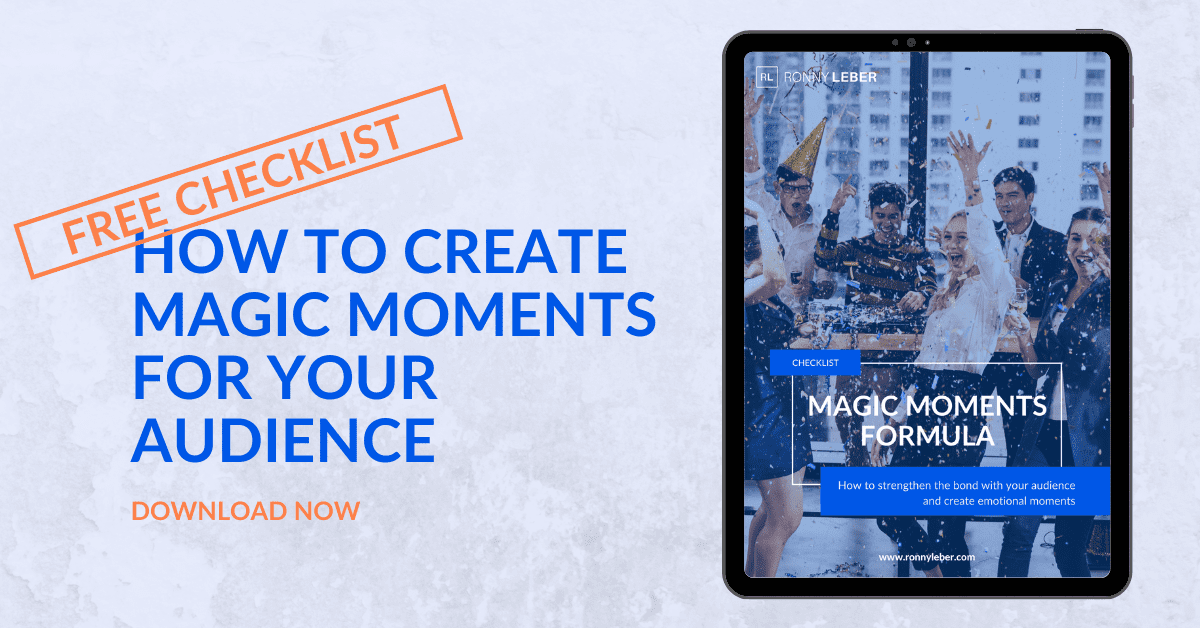
Stop guessing how to WOW your audience!
We will send you our secret ingredients to WOW your audience for free! In the MAGIC MOMENTS FORMULA you can learn how to take any audience of any size and create a deep emotional experience for them in order to create a deeper emotional bond with you and your brand.
4. For your webinar to be successful, it needs a clear structure

Without a clear structure, it does not work. Dedicate enough time to your webinar to allow for an effective structure. Suspense and dramaturgy should not be foreign words in a webinar. With an intelligent structure, your participants will stay with you until the end. It would be a pity if the highlight of your presentation was only viewed by a handful of participants in the last few minutes because a large part of them dropped out of the seminar out of sheer boredom.
The webinar must not become a sales event
Make sure that your webinar does not look like a sales-only seminar. Who doesn’t get frustrated when the neighbors tell stories of their last holiday trip when they spent hours “visiting” a carpet factory next to the actual excursion attraction? Hopefully, I don’t need to mention that nobody wants to see this kind of webinar. Your audience will thank you at the end with an increase in conversions if they get real added value.
How does a webinar work?
Normally, a participant registers for a webinar with his or her name via a landing page (which can be on your website) and e-mail address. He will then receive a confirmation and an invitation via a link to his email address. The link then takes him to the platform on which the webinar is offered. Here the user should get further information about the process and the content from you right at the beginning. The more interaction that happens with your participants, for example if they can ask questions or interact with other participants in advance, the better your presentation will be received.
5. What do you need for webinars?
An important element is of course the technology. Besides a reliable platform for webinars, the technical equipment is another important task in the preparation.
If you want to be successful online, in addition to a reliable webinar platform you also need:
- A laptop with an excellent webcam or a good external camera
- Good lighting: your participants love it when they can see you in the video and not just a shadow.
- A good microphone; you should not save on that. In any case, it is an investment that pays off.
- As an alternative to a microphone, you can also use a good headset.
- A neutral background is not a must as long as it doesn’t look super messy behind you.
If you have any questions about the technology, I have put together a list of resources for your home studio on our website. Here you will find my personal recommendation for useful equipment, like the camera I use for my online presentation.
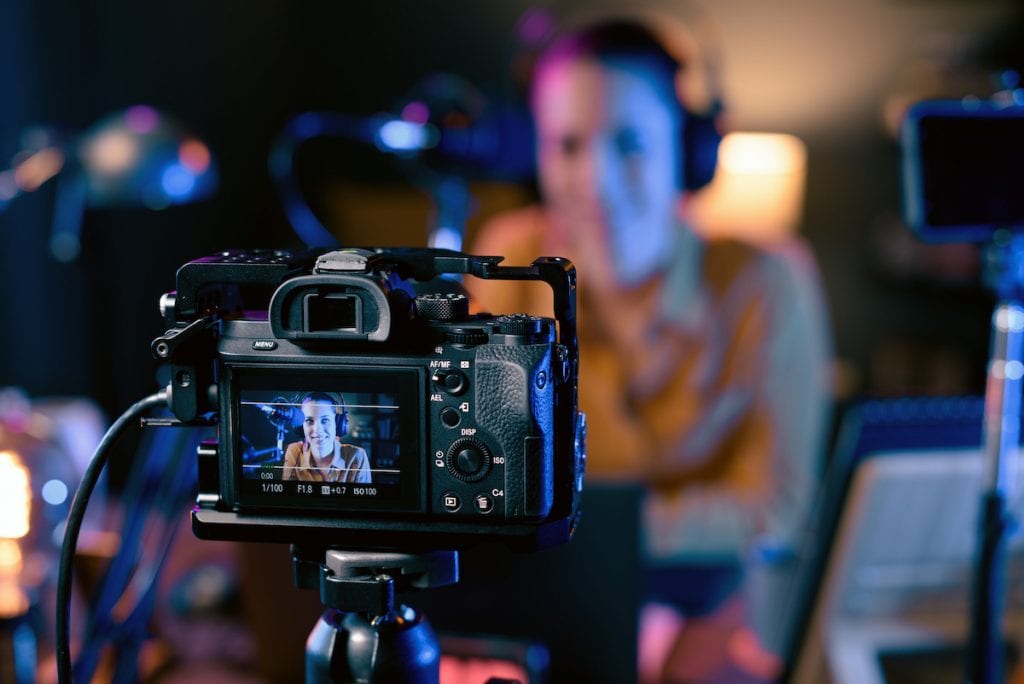
Will you be seen at the webinar?
… a question I am often asked in connection with webinars. It depends on your goal. If you give a purely informational webinar, a powerpoint presentation is perfectly sufficient. But if you want to promote your expertise with webinars or sell a high-priced product, you should be seen. In short: if you want to position yourself in a high-class way and invest in your brand power, it is worthwhile to switch on the webcam as well as the headset.
6. How will you promote your webinar? What should the marketing look like?
Marketing is also an important point in your preparation for your webinar. Of course it is important to get the right people to attend your webinar. This can happen in three ways on the internet:
- free traffic (organic)
- paid traffic (switched advertising)
- borrowed traffic (through joint-venture partners)
The goal is of course always that both the paid and the borrowed traffic becomes free traffic in the long run. How do you implement this now?
Start with organic marketing
I always recommend keeping the first webinar session “organic” – without paid advertising. Of course you can use your social media channels and your website to promote your webinar. If the first webinar is successful, nothing stands in the way of a paid strategy.

Scaling with paid advertising
For example, place ads on Google or Facebook and direct the traffic to the webinar login. There, your webinar participants can register immediately by e-mail and your e-mail distribution-list will grow automatically.
What can a webinar cost?
This is difficult to answer in general. It depends on the benefits that your participants get from it. If the webinar is of a high quality and contains additional content that is really interesting and of great benefit then the cost can be in the three-figure range. However, since many webinars are used to generate leads for the website, most of them are free of charge or range from €39 to €79.
7. On which channels do you want to distribute your webinar?
There are various channels – especially on social media platforms – where you can distribute your webinar recording afterwards. Youtube is one of the most successful channels by far. Distributing your webinar as YouTube video also provides good content for your website. In addition to YouTube, you can also offer your webinars on Facebook and LinkedIn. A good webinar platform – for example Webinar Ninja, which we use – also enables your participants to watch the recording there afterwards.

The webinar live or as a recording?
This question can be answered very easily: do it live as often as possible until it is perfect and then you can pre-record them and upload them online. The reason is simple: your webinars at the beginning will not be as good as they will be after you have held them numerous times. Whether you put them on YouTube or your website once you’ve perfected them or continue to do them live is up to you.
“The perfect webinar”
Russell Brunson’s book Expert Secrets provides a guide to how best to structure your webinar. I can only warmly recommend this book if you want to be in the professional league of top webinars. Under “Secret No.12”, you will find detailed instructions on how to set up your perfect webinar step by step. As a gift, you can order Expert Secrets here for free.
What happens after the webinar?
A webinar does not end after the broadcast. Set up an email sequence in advance, which will be sent to the participants later. A different sequence should be sent to the people who registered but did not attend. Send a link to watch the recording again to optimize the added value that your tips provide. Thank them for their participation and draw attention to future webinars.
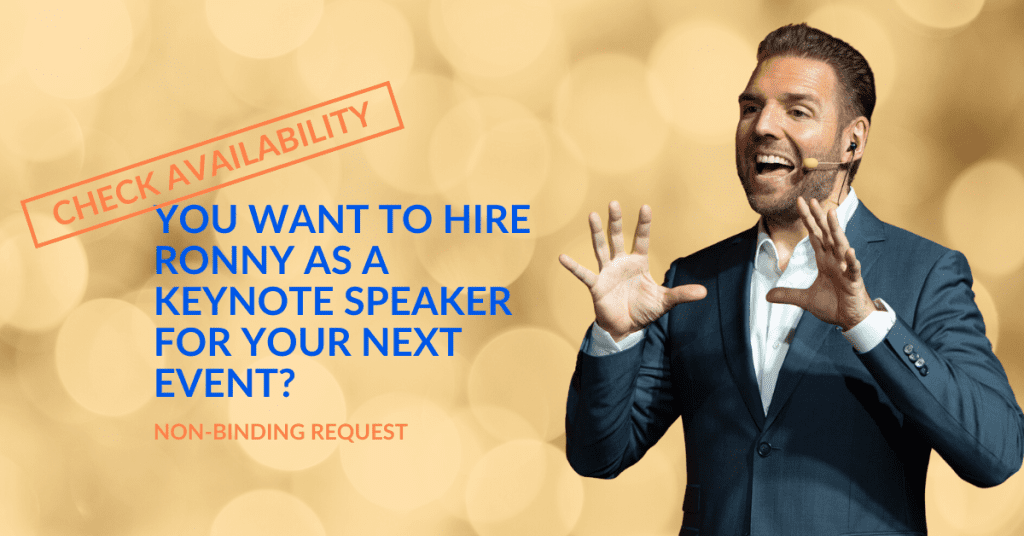
Request Ronny as moderator for your next event without obligation
Simply click on the button and ask Ronny as moderator for your next event, your next gala, your next corporate event without obligation
How to become a webinar professional
Everything is hard at the beginning. But if you implement and practice the steps from this article bit by bit, I’m sure you’ll soon be able to spread your best content in webinars yourself and thus open up completely new customer groups!

How can I help you to achieve webinar success?
On which topic would you like to hold a webinar? How can I help you with that? Please leave your answer here in a comment or contact me directly.





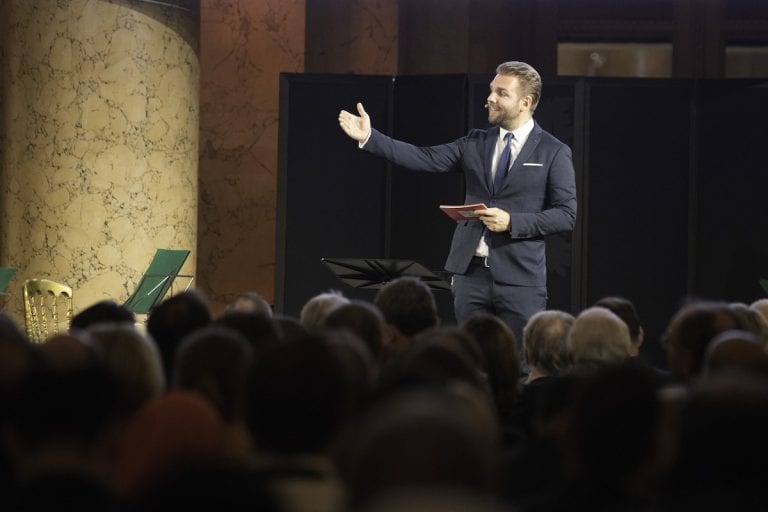



 Contact
Contact







